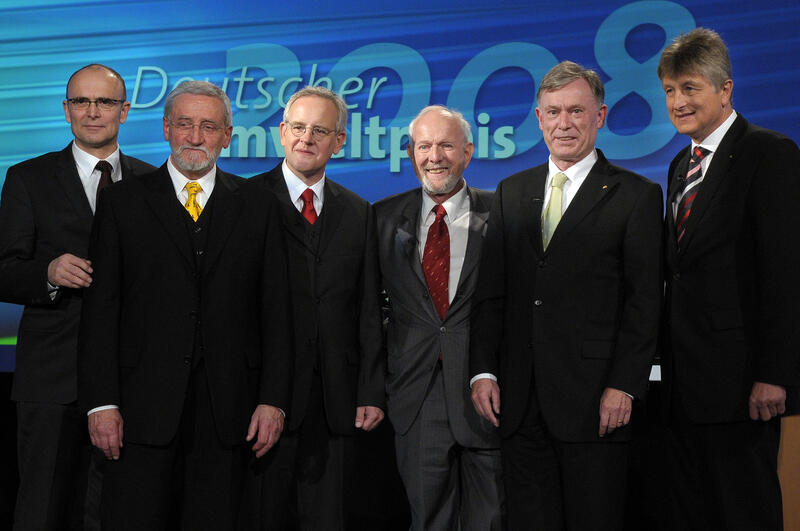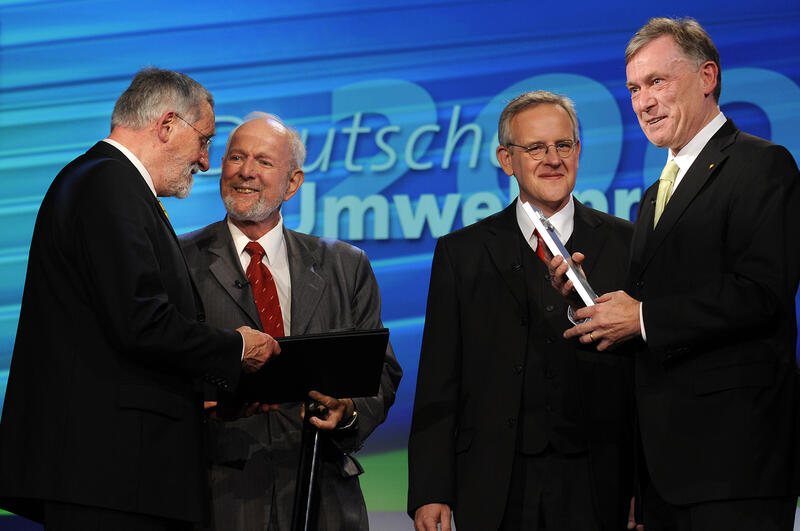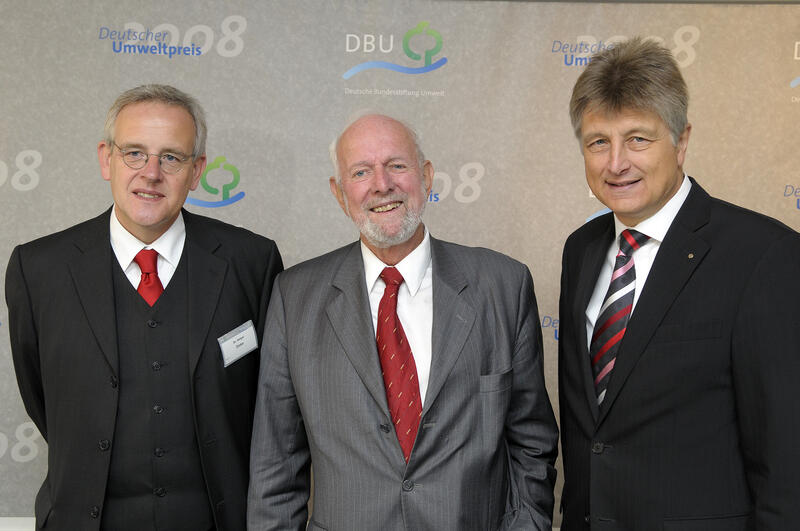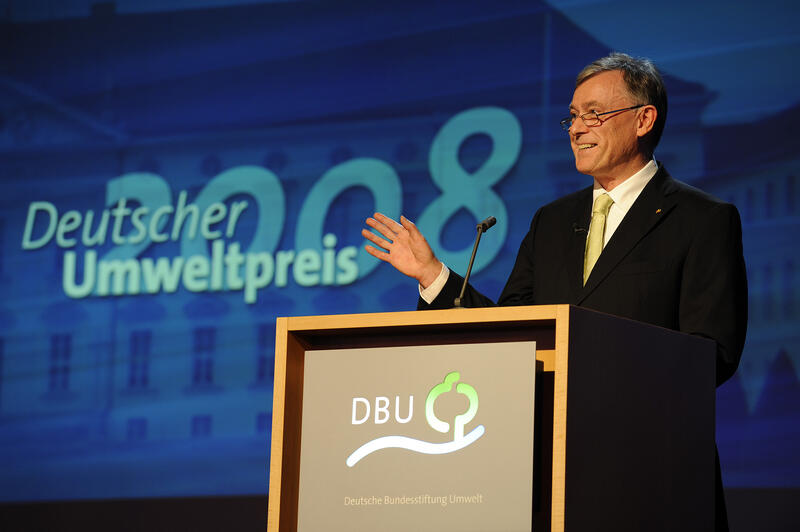Köhler: „We need a comprehensive strategy for implementing the idea of sustainability“
The German Environmental Award of the Deutsche Bundesstiftung Umwelt (DBU, Osnabrück) has been awarded for the 16th time. The 500,000-euro award, the most lucrative environmental prize in Europe, is being shared by the Dean of the Donald Bren School of Environmental Science and Management, Prof. Ernst Ulrich von Weizsäcker (69), and the founder and CEO of the biotech company BRAIN AG, Dr. Holger Zinke (45). At the presentation ceremony in the Rostock town hall today, German President Horst Köhler emphasised the necessity for a new industrial revolution in energy and resource productivity - away from fossil fuels towards renewable energy sources. Mr Köhler: "Small course corrections are no longer enough. We need a comprehensive strategy for implementing the wonderful, good idea of sustainability."
The industrialised countries had to drastically reduce their ecological footprint in the world without further delay
Speaking in front of 1,100 guests, Mr Köhler said that the challenges facing humanity were huge. In fifty years, he said, over nine billion people would be living on the earth, all of them striving to emulate the model that the Western industrial states had evolved over the past 150 years. Mr Köhler: "A model that, as we now know, overstrains the earth's capacity if everyone follows it." For this reason, he said, a model of prosperity had to be developed and above all put into practice as an example that could be sustained and applied all over the world. He said the industrialised countries had to drastically reduce their ecological footprint in the world without further delay. At the same time, he added, the developing and emerging nations needed technologies and production methods that allowed them to avoid past chapters in our own industrialisation process that were particularly harmful to the environment. Mr Köhler: "The world, in particular the Western industrialised nations, including us in Germany as well, is still far removed from a model with such sustainable future potential."

©
Around a quarter of all mammals were threatened with extinction
Mr Köhler went on to say that much had been done in the field of sustainability in the past few years, in the political arena as well. However, he said, in Germany, the goal of doubling resource productivity by 2020 could probably no longer be reached "if we do not step up our speed considerably." He said that it was worrying, for example, that carbon dioxide emissions had drastically increased worldwide, exceeding even the most pessimistic prognoses of the World Climate Council. Equally concerning, he said, was the fact that, according to the most recent studies, around a quarter of all mammals were threatened with extinction.
Revolution in energy and resource productivity is needed
A sustainable model of prosperity required inventive talent and engineering knowledge, he said. He said that, as an all-round leader in the field of energy and resource productivity, Germany was in a position to develop ways to save electricity and heating using modern technology. Mr Köhler: "We have the creativity and the technical possibilities to bring about a revolution in energy and resource productivity. This should give us the courage to use them consistently as well." The objective, he said, was to render usable the greatest untapped source of energy - the saving of energy." Mr Köhler: "The German economy has every reason to see an efficiency revolution as its great chance."
Each generation has to leave the earth in a better state than the one in which they had taken it over
However, he said, sustainability was above all a question of personal attitude and of lifestyle. He said that all of us had to examine our attitudes and work towards a new balance "between the wishes of the individual and that which the earth can bear." He said this was not a matter of asceticism, but of finding a middle path of moderation for the one world of ours. Doing without in a deliberate and affirmative way, he maintained, could mean a gain in quality of life. People who sought only material wealth, he said, had less chance of finding contentment in life than those
who had personal goals going beyond mere consumption and who cultivated social relations. Mr Köhler: "Only when people are capable of wanting less can they retain control over their own needs." He said that people needed to be ready to act according to the principle that each generation has to leave the earth in a better state than the one in which they had taken it over; they had to be ready to ensure that their lifestyle did not endanger the life of others, the president said, quoting the Nobel peace prize winner Muhammad Yunus.

©

©
"The only true realist is a visionary"
Mr Köhler said that the winners of the 2008 German Environmental Award - the "most important environmental award in Europe", Mr Köhler said, quoting a national German daily - also stood for the idea of sustainability. They gave practical and theoretical answers to the question of how to help coming generations to secure their basic natural, economic and social needs in view of a growing world population, he said. He said that Prof. von Weizsäcker and Dr. Zinke showed that the vision of greatly reducing energy consumption and the use of resources did not have to remain a utopian dream. Mr Köhler: "The only true realist is a visionary."
Prof. von Weizsäcker was probably the first person to draw attention to how much we subsidised our prosperity by using and exploiting nature
Prof. Klaus Töpfer - a member of the jury, himself an Environmental Award winner and the former director of the environmental programme of the United Nations - emphasised in his eulogy, conveyed by video message, that Prof. von Weizsäcker was probably the first person to draw attention to how much we subsidised our prosperity by using and exploiting nature. Töpfer said that Weizsäcker had not shied away from taking political responsibility and fighting at the highest levels worldwide for a more effective use of our natural resources.
Dr. Zinke and his team had succeeded in making a medium-sized German company a pacemaker for the development of an entire branch of industry
Speaking about Dr. Zinke, also in a video message, Dr. Wolfgang Plischke - a member of the jury and of the Management Board at Bayer AG - said he had given important impetus to "white" biotechnology in Germany. Dr. Plischke said that Dr. Zinke had used the "toolbox of nature" to identify completely new biological agents that allowed conventional chemical industrial processes to be replaced by more environmentally-friendly biological procedures. According to Dr. Plischke, this saved energy and materials, eased the burden on fossil resources and made us more independent from raw materials of only limited availability. He said Dr. Zinke and his team had succeeded in making a medium-sized German company a pacemaker for the development of an entire branch of industry.
The importance of an ecological tax reform
In his interview with the moderator Stefan Schulze-Hausmann, Prof. von Weizsäcker stressed that, of all his professional positions, he had probably been happiest working at the Wuppertal institute, and that he and his 150 co-workers had accomplished much there. With regard to the present, he emphasised the importance of an ecological tax reform, which, he said, was the most people-friendly and socially and economically compatible form of taxation. He said that these ideas need to be transferred to Asian growth regions as well, because that was where “the music is playing”. He added that, of course, questions of energy and resource productivity also needed to be intensively followed up.
Many years of work as biological conscience of the industry
In his acceptance speech, Dr. Zinke - at 45, the youngest-ever winner of the Environmental Award - said that he was receiving the honour on behalf of his company and all 72 people who worked there. He said that, together with them, he was delighted and proud that the many years of work as the "biological conscience of the industry" had been recognised by the awarding of such a prestigious prize. At the same time, he said, his company saw this honour as a confirmation of its contribution to the process of industrial transformation and as a motivation to develop further products and processes for sustainable management.

©